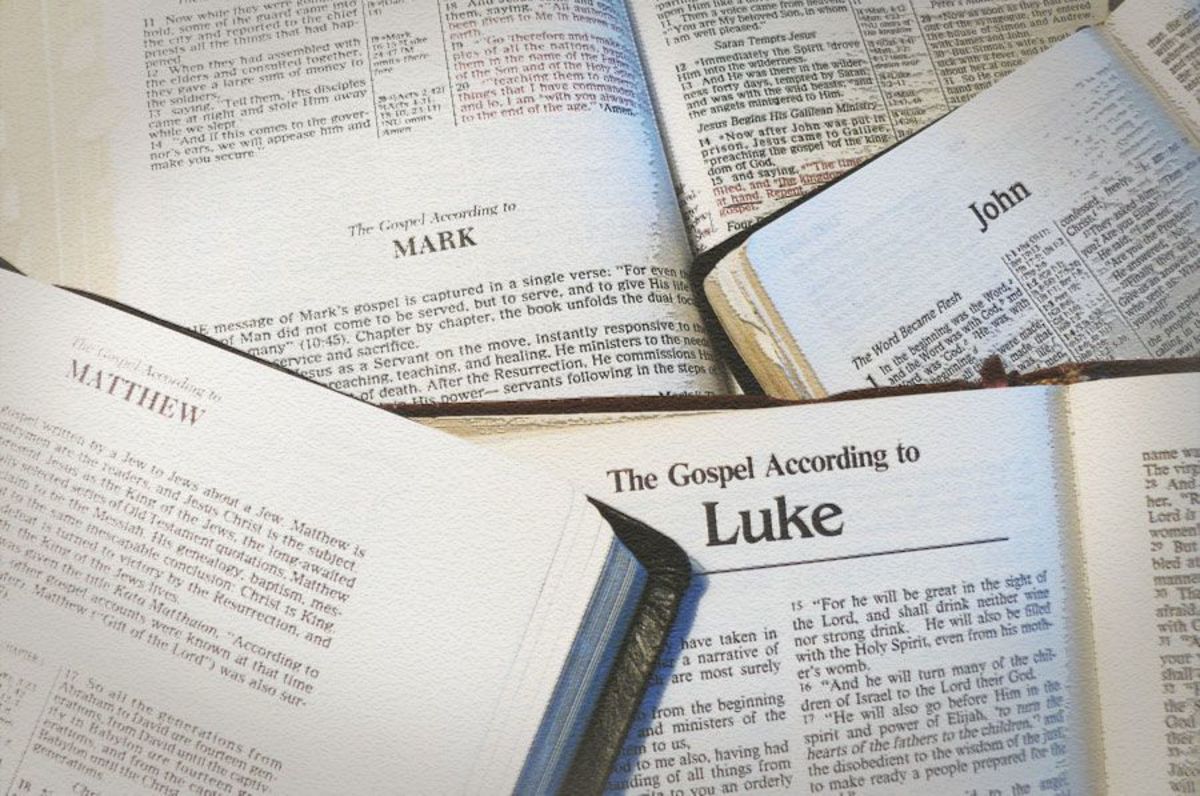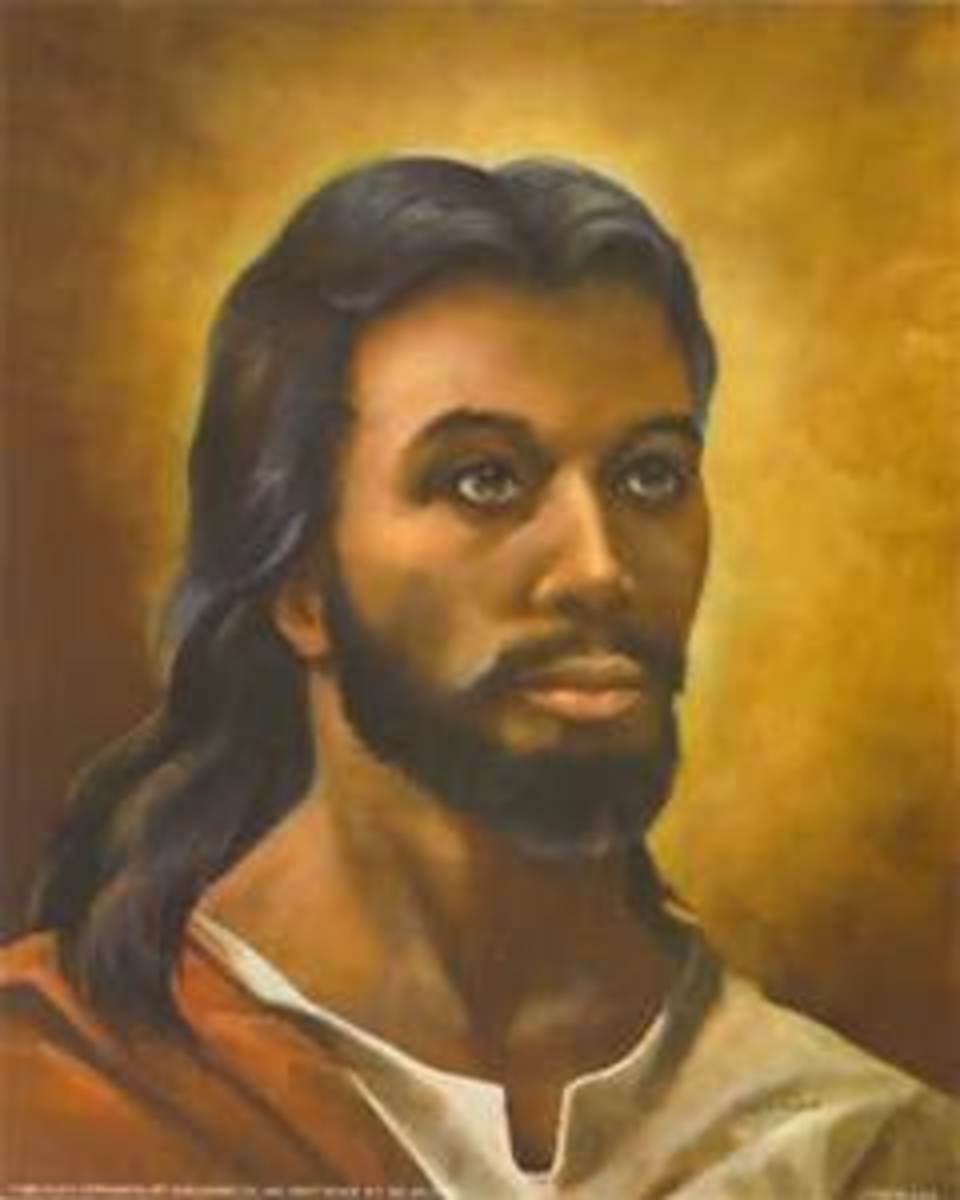Bible: What Does Luke 11 Teach Us About "The Disciples' Prayer," the Holy Spirit and "Exorcism," and the Messiah?
Jesus With His Apostles
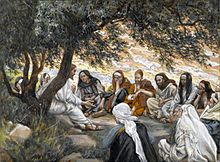
The Disciples' Prayer
Luke now inserts the “Disciples’ Prayer”—something Matthew included in the Sermon on the Mount early in Jesus’ ministry (vv. 1-4; cf. Matt. 6:9-13).
Comment: One may surmise from the elementary nature of the disciple’s request that this episode occurred in the early stages, and Luke simply did not decide to include it until this place in his narrative. On the other hand, since the present rendition differs enough from the other in word and circumstances—it seems to take place in a far more private setting than that of the Sermon (“as He was praying in a certain place” [v. 1a])—it may well be a separate recitation of the prayer. In addition, Matthew says nothing about a disciple spokesman asking Rabbi Jesus to teach them how to pray (v. 1b).]
Verse two’s wording is identical to Matthew’s, and verse three differs only with respect to a few words (“this,” [Matt.]; “day to day” [Lk.]). In verse four, however, Luke substitutes “sins” for Matthew’s “debts,” and has Jesus rephrase His instruction about forgiving debtors, replacing a correlative adverb of manner (Dana and Mantey, A Manual Grammar of the Greek New Testament, 238) “as” with a causal conjunction “for.”
[Question: How will believers receive divine forgiveness of their debts?
Answer: They will receive it in the same way they forgive their debtors (Matthew);
Question: Why should God forgive them?
Answer: He grants them forgiveness because they have forgiven their debtors.]
Luke also omits the final ascription of praise to God (cf. Mt. 6:13).
[The NU, in fact, omits several words from Luke’s version: “Our,” “in heaven,” “Your will be done on earth as it is in heaven,” “But deliver us from the evil one.”]
Believing Prayer

Importunity
Jesus continues His teaching about prayer with an illustration that may involve the importance of importunity in that discipline; He also provides some follow-up principles.
First, He discusses “The Case of the Persistent Friend” (vv. 5-8).
The Lord places His disciples individually in the circumstances of a friend who asks another “friend” to get out of bed and lend him bread to feed a third “friend” who visits unexpectedly (vv. 5-7a).
Jesus pictures the sleepy “friend” as one who is initially unwilling to honor the request, but who changes his mind because of the persistence of his breadless friend (vv. 7b-8).
[Will the sleepy friend meet the needs of his breadless friend because of the latter’s persistent knocking—the text does not say that the friend knocked and asked persistently.
Only the present progressive nature of the exhortations “ask,” “seek” and “knock” in the next verse hints at this possibility—or because he is averse to the damage to his reputation that his inhospitality would cause?]
Christ summarizes His point with three pithy exhortations—keep asking, keep seeking, keep knocking—elements necessary to realize answers to prayer (“it will be given to you/receives,” “you will find/finds,” “it will be opened to you/it will be opened”) [vv. 9-10].
Then He follows this word with three homey, hypothetical, though illustrative questions that expect jocular “No, of course not” answers (vv. 11-12).
[In essence, He says, “Since you—imperfect, fallen fathers as you are—would certainly not give your sons the wrong things (namely, a snake instead of a fish, a scorpion instead of an egg), obviously your perfectly good Father in heaven will always maintain His spotless reputation and give “good things,” even the perfect gift—the Holy Spirit—to the sons who ask according to His will].
This exhortation provides great incentive to pray (v. 13; cf. Mt. 7:11—substitutes “good things” for “Holy Spirit”).
[Regarding the “giving” of the Holy Spirit, Jesus speaks to Jewish believers here, not to the Church.
All members of the Church—the Church began on the day of Pentecost—have all of the Holy Spirit they will ever have.
The question remaining for us is not “How much more of the Spirit can we obtain?”; it is “How much more of our lives will we submit to the Spirit’s control?”]
The Holy Spirit's Ministry
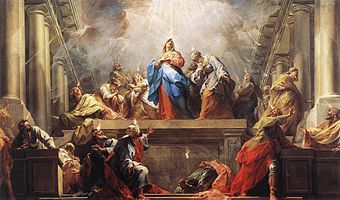
Writing about the Holy Spirit leads Luke to inject an episode discussing His relationship to exorcism (vv. 14-23).
[Chronology does not concern the evangelist; his emphases flow along thematic lines.]
Jesus’ casting out of a mute demon elicits a strong objection from “some of them” in the multitude.
While Luke leaves this group unlabeled (vv. 14-15), Matthew designates these opponents as Pharisees (9:32-34; 12:22-30).
[In one place, Matthew writes about the man being mute and demon-possessed (9:32); in the other, he refers to a man “demon-possessed, blind and mute” (12:22).
The former scene includes the same general Pharisaical reaction as the latter—“casts out demons by the ruler of the demons” and “does not cast out demons except by Beelzebub, the ruler of the demons”—but only the latter one contains Jesus’ logical argument against His enemies.
Though Matthew describes his latter individual as afflicted with blindness also and Luke designates the individual a “mute demon,” the person appears to be the same.
The healing of the first mute constitutes an earlier event.]
One group of Jesus’ adversaries charges Him with using Satan’s power to exorcise (v. 15b); another one demands from Him a “sign from heaven”—a miracle proving that His authority is from God (v. 16).
[Luke combines these two attacks into one; Matthew separates them (see 12:24, 38).]
Since both Luke and Matthew record that Jesus drew upon His omniscience here to confront the Pharisees (v. 17a; cf. 12:25), it seems obvious that He did not hear their accusation.
Although the accounts in all three Synoptics share common ideas and words, Luke’s version contains several lines that diverge from the others and thus may be recounting a different event.
First, note below how dissimilar the gospels are even in the concepts they share:
How Will Satan's Kingdom Stand?
Luke
| Mark
| Matthew
|
|---|---|---|
“Every kingdom divided against itself is brought to desolation, and a house divided against a house falls. If Satan also is divided against himself, how will his kingdom stand? Because you say I cast out demons by Beelzebub. And if I cast out demons by Beelzebub, by whom do your sons cast them out? Therefore they will be your judges. But if I cast out demons with the finger of God, surely the kingdom of God has come upon you.”
| “How can Satan cast out Satan? If a kingdom is divided against itself, that kingdom cannot stand. And if a house is divided against itself, that house cannot stand. And if Satan has risen up against himself, and is divided, he cannot stand, but has an end.
| “Every kingdom divided against itself is brought to desolation, and every city or house divided against itself will not stand. If Satan casts out Satan, he is divided against himself. How then will his kingdom stand? And if I cast out demons by Beelzebub, by whom do your sons cast them out? Therefore they shall be your judges. But if I cast out demons by the Spirit of God, surely the kingdom of God has come upon you.”
|
Satan
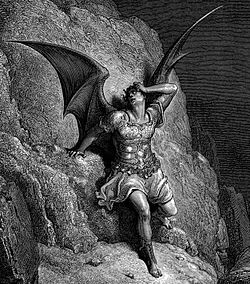
In most places the text is identical; however, in others, one can see additions to the text or substitutions of one term for another.
Note especially the fragment in Luke—“Because you say I cast out demons by Beelzebub (v. 18b).
[Was Jesus here responding to a question?]
One evangelist inserts a question—“How can Satan cast out Satan?” (Mark)—, but another introduces a conditional statement—“If Satan casts out Satan” (Matthew).
Whereas both Luke and Matthew begin Jesus’ response with the same declarative assertion—“Every kingdom divided against itself is brought to desolation—Mark writes it as a conditional—“If a kingdom is divided against itself, . . .”
Luke shares more text with Matthew than he does with Mark, but Matthew borrows at least one turn of a phrase from Mark that Luke does not.
When considering the last three verses in this speech (vv. 21-23), one can see that Luke may be recording another occasion when Jesus confronted Pharisees on the same subject, but used different words.
The chart below shows the changes:
He Who Is Not With Me Is Against Me
Luke
| Mark
| Matthew
|
|---|---|---|
“When a strong man, fully armed, guards his own palace, his goods are in peace. But when a stronger than he comes upon him and overcomes him, he takes from him all his armor in which he trusted, and divides his spoils. He who is not with Me is against Me, and he who does not gather with Me scatters.”
| “No one can enter a strong man’s house and plunder his goods, unless he first binds the strong man. And then he will plunder his house.”
| “Or how can one enter a strong man’s house and plunder his goods, unless he first binds the strong man? And then he will plunder his house. He who is not with Me is against Me, and he who does not gather with Me scatters abroad.”
|
The first half of Matthew and Mark is very similar in content and differs only in structure, the former putting an interrogative into Jesus’ mouth while the latter penning it as a declarative statement.
The second half of Matthew’s account is identical with that of Luke, except for the one addition—“abroad.” Luke’s first half, however, contains assertions that neither Matthew nor Mark has.
[It is possible that Jesus may have spoken these words, and then uttered those that Matthew and Mark record.
If this arrangement constitutes a possible harmony, then perhaps Luke omits the verses the other evangelists used because he thought them superfluous.]
[See Matthew for the interpretation of this passage.]
Luke attaches to his discussion of Satan a short allegory regarding the return of a demon to his “house” (vv. 24-26).
Besides having a different textual arrangement—Matthew places three other teachings between Jesus’ “A House Divided” speech and His “An Unclean Spirit Returns” remarks (12:31-42)—Luke’s rendition of the latter instruction varies only in that it does not include Matthew’s “So shall it also be with this wicked generation” (12:45).
Mark does not have this story in his gospel.
[Jesus is commenting here about the declining moral conditions in Israel.]
Before reporting how Jesus handled the Jews’ hankering after a “sign” (vv. 29-32), Luke inserts a short exchange the Lord had with a certain vociferous woman in the crowd.
Interpreters may construe this outburst as an exclamation of praise for Mary, Jesus’ mother, as she comes to “talk” with Him (v. 27; cf. Matthew 12:46-50), or they may understand it as an indictment of Mary for her failure to obey His word (v. 28).
[One may prefer to be generous and say that Jesus was not criticizing His relatives, but commending His followers.]
As the crowd increased, Christ returns to illustrate the wickedness of that present generation in Israel—evil it manifested by seeking a sign, but not intending to believe it (v. 29a; cf. vv. 16, 26).
[Their asking Jesus to demonstrate the authenticity of His claim to Messiahship does not constitute evidence of their wickedness; in fact, wisdom obligated the Jews to seek proof from anyone who claimed this position.
Rather, their evil manifests itself in their willful disobedience to and unbelief of the message that Jesus’ miracles had delivered.]
Comparing Luke with Matthew, we find that the former omits a few words and rearranges an item or two.
The chart below shows the differences.
One can easily combine these accounts to determine all of Jesus’ words on this occasion.
An Evil and Adulterous Generation
Matthew
| Luke
|
|---|---|
“An evil and adulterous generation seeks after a sign” (Matt. 12:39) “As Jonah was three days and three nights in the belly of the great fish, so will the Son of Man be three days and three nights in the heart of the earth” (v. 40).
| “This is an evil generation. It seeks a sign . . .” (v. 29). “Jonah became a sign to the Ninevites, so also the Son of Man will be to this generation” (v. 30).
|
The Prophet Jonah
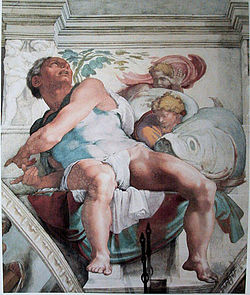
In addition, Luke presents the queen of Sheba’s testimony first and that of the men of Nineveh second (vv. 31-32); Matthew reverses that order (12:41-42).
[Again, the order in which statements appear does not seem vitally important to the evangelists; in addition, they select what they desire to record and omit the rest.] [See Matthew’s gospel for the interpretation.]
The next lesson (about the lamp of the body) may relate somewhat to the testimony theme mentioned in the previous context.
The Queen of Sheba and the men of Nineveh all heard a message that changed their lives; they will testify someday in the Judgment to the wisdom of God as manifested through Jonah and Solomon (vv. 31-32).
Likewise, the one whose “whole body is full of light” because his “eye” is “clear/healthy” (vv. 34-36)—that is, he “sees” spiritual things clearly and possesses keen spiritual insight—should not fearfully hide what he knows, but testify to the truth (v. 33).
Jesus and the Pharisees
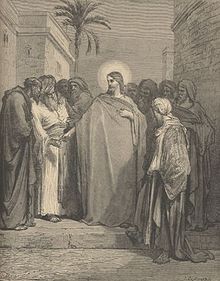
John MacArthur--Pastor-Teacher
Intrigued by Jesus’ wisdom, a Pharisee invites Him to dinner to hear more (v. 37).
When the Lord—as a matter of habit or purposely to confront an issue—sits down immediately and does not ceremonially cleanse Himself, the Jew marvels (v. 38).
Taking His cue from this reaction, Christ goes on the offensive and lambastes His host’s false religiosity with a mini-rehearsal of a later denunciation of Israel’s leadership (vv. 39-44; cf. Matt. 23:2-36).
First, He reveals their foolish obsession with appearances (vv. 39-40), and even points out a way to correct it (v. 41);
Second, He criticizes them for majoring on the minors and neglecting the majors (v. 42);
Third, He reveals their selfish pride (v. 43); and
Fourth, He accuses them of causing others to defile themselves, comparing them to unseen graves upon which people unknowingly walk (v. 44).
Hearing the Lord trample on the group’s reputation, a lawyer interrupts Jesus’ “woes” to complain about this latter criticism (v. 45; cf. v. 44a).
In response, Christ condemns the inequities of this man’s profession, too (vv. 46-52).
Not only does Jesus denounce the lawyers’ lack of compassion toward the commoner (v. 46), but He also accuses them of complicity with their forefathers in the murders of the righteous (vv. 47-51).
Finally, Christ censures them for keeping the truth of God from the people, thus preventing them from entering the kingdom (v. 52).
He also does not hesitate to judge that they themselves have not entered it (v. 52b).
Afterwards, having concluded His remarks, Christ fends off vicious verbal and legal attacks from the two groups He had just assailed (vv. 53-54).
© 2013 glynch1




